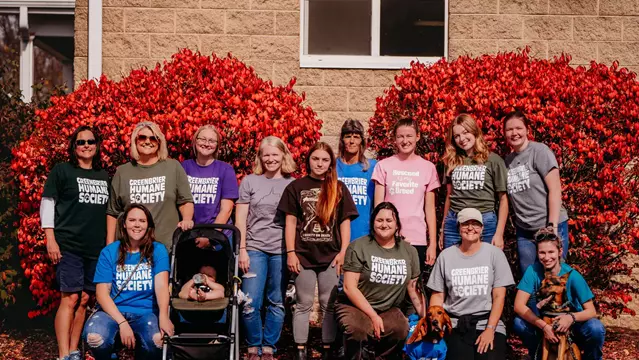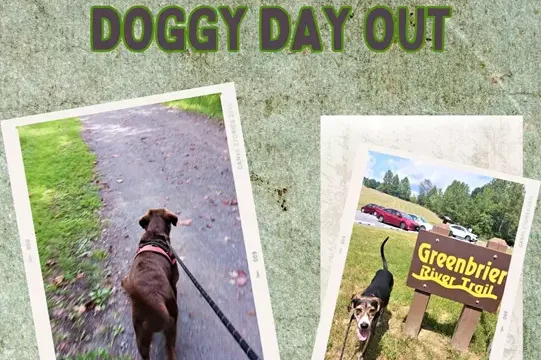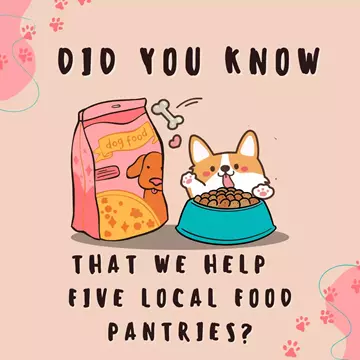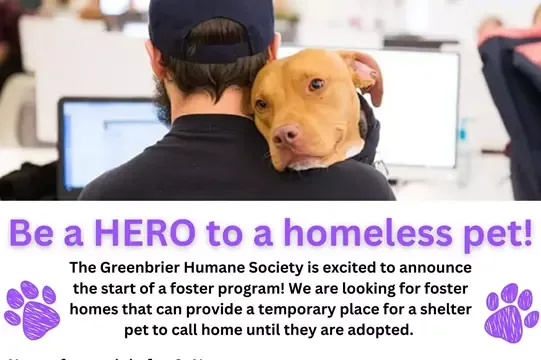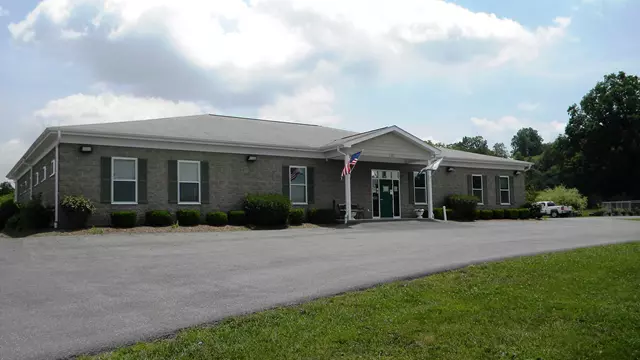The Greenbrier Humane Society was established in 1965 and incorporated in 1986 as a non-profit organization. Since its formation, GHS has grown with the needs of the rural communities it serves. The Greenbrier Humane Society coordinates several programs. These programs include the spay/neuter program, adoption/foster, lost & found, food pantries, and educational programs with area schools.
Our Mission Statement:
The Primary mission of the Greenbrier Humane Society is to protect animals from neglect, abuse and exploitation: to advocate for their interest and welfare: and to inspire awareness and compassion for all living things.
Adoptable Pets
Rehoming
FAQs
If you’ve lost your pet, make sure you contact us right away so we can be on the lookout for him/her and post a lost report on our lost/found board at the shelter.
As a non-profit organization, the money we do receive is vital to our operations. Unfortunately we never know when money will be coming in or how much if at all. We therefore can only offer assistance for spaying and neutering at this time. There are many organizations on the internet that do offer this type of assistance and a quick web search will start you in the right direction.
We gladly accept volunteers. Any volunteer under the age of 18 must have a parent or legal guardian present with them at all times.
Volunteers are needed to both socialize cats and walk dogs. Once you are trained as a volunteer you may stop by at your leisure during our kennel hours (11am- 5pm Tuesday-Friday) to get a volunteer badge and go “do your thing” for as long as you want!
- Be patient: When you first bring your new pet home, give them space to explore.
- Consider your lifestyle: Make sure your pet’s energy level matches yours.
- Consider family dynamics: If you have children, ensure your new pet is child-friendly. If you already have pets, make sure they can get along with the new pet.
- Meet your new pet: Trust your judgment on whether the pet’s personality is a good match for you and any other family members or pets.
- Pet-proof your home: This ensures that your pet has a safe environment.
- Consider more than one pet: Having more than one pet can give the animal a constant companion. However, some pets don’t always take kindly to having competition in the home.
- Apply: The adoption application is a necessary step to being matched with the right animal.
- Check rescue sites daily: Check the shelters daily until your pet is found.
- Energy level
- Size when fully grown
- Relating to other animals and children
- Noise level of the pet
- Ensuring everyone knows who is responsible for the care of your pet
Almost all of our adoptions have their surgeries done in our in house surgery suite by the veterinarian assigned that week. We perform surgeries Tuesdays and Thursdays on those animals so they may go home the following day, Wednesdays and Fridays respectively. If by chance the surgery is not in house, you will be instructed to which day your new friend can go home.
We are located on Route 60 West about 1/4 mile outside of Downtown Lewisburg, W.V. Coming from Lewisburg, headed west on 60; we are the second paved road on the left hand side (Holliday Lane- in the “dip”) after you pass Jim’s Drive-In on the right.
The Humane Society of the United States estimates that some 300,000 homeless animals are euthanized in shelters every year, so by spaying and neutering your pets you are helping curb the crisis of animal overpopulation. Here are some myths and facts about spaying and neutering, as provided by the ASPCA.
Vaccinating animals at intake is one of the most powerful ways to save lives in the shelter. It’s a double win: Vaccines prevent or limit disease in individual animals while reducing risk for other animals.




